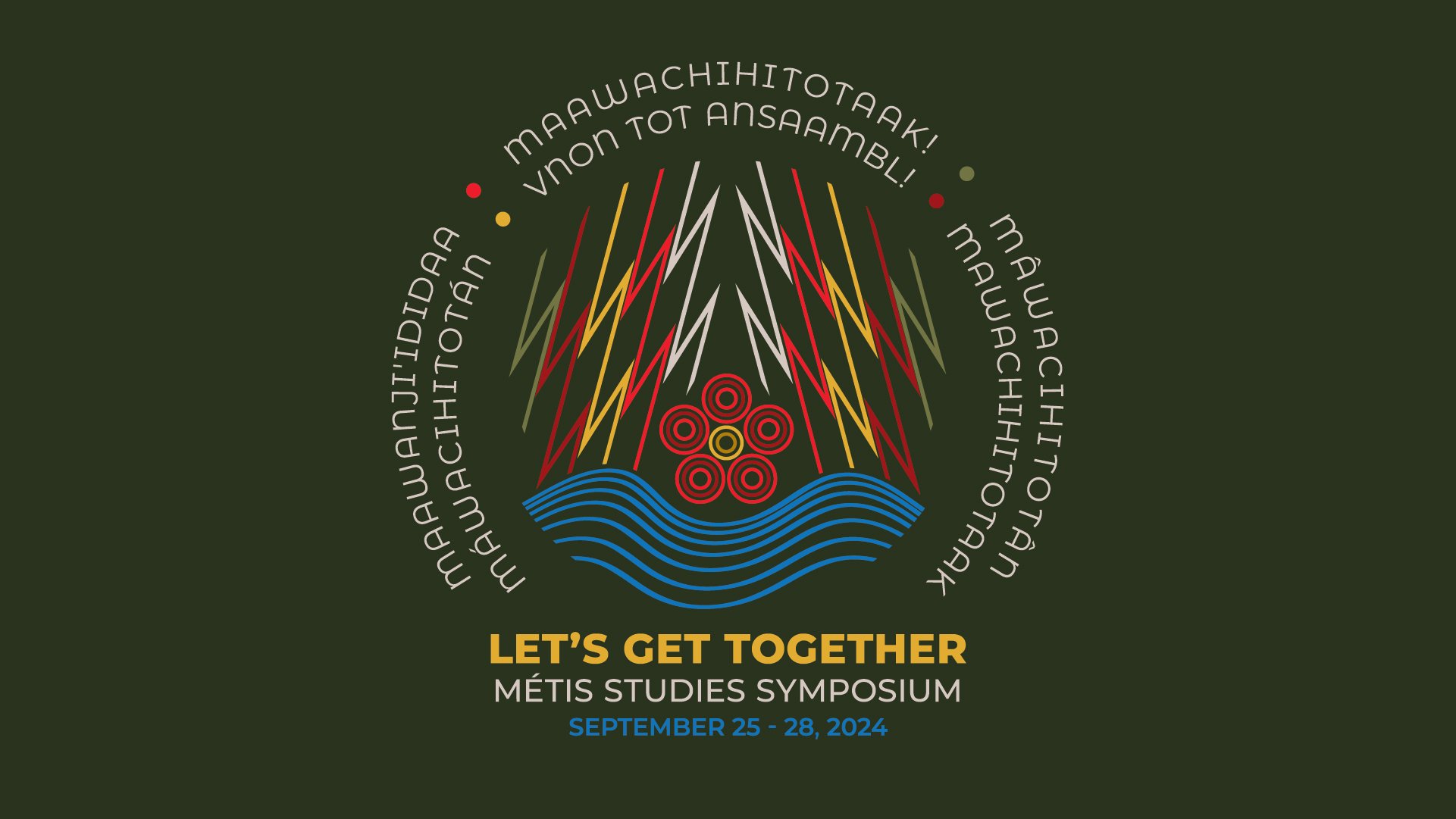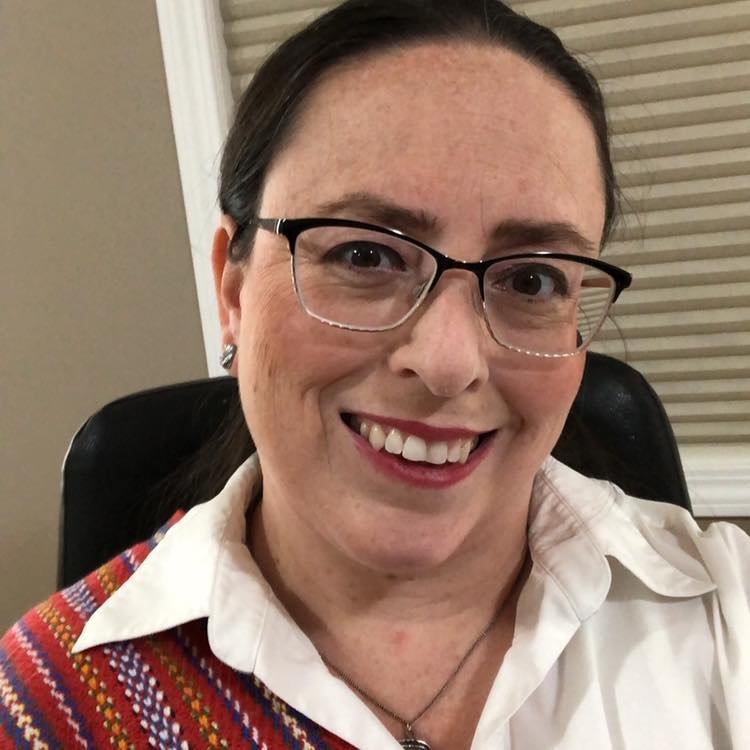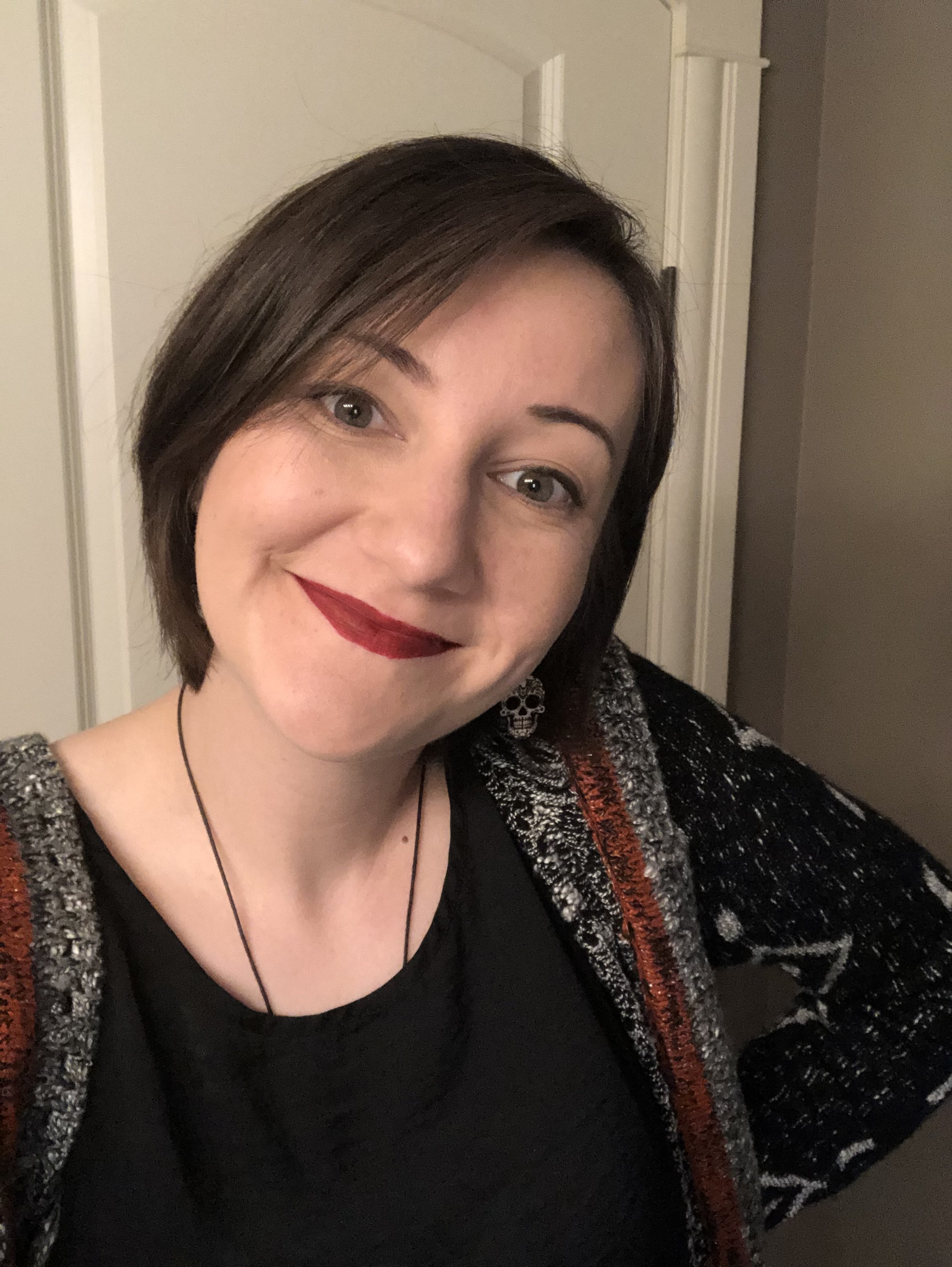Mawachihitotaak 2024
Over the past year, visioning and planning have been underway for the second Mawachihitotaak (Let’s Get Together) Metis Studies Symposium to bring together a diverse community of Métis thinkers. This gathering will occur in Winnipeg, Manitoba, from September 25-28, 2024, at the University of Manitoba. We intend to create a space for Métis scholars, artists makers, Elders, knowledge holders, students, language speakers, organizers, writers, and other community members to share knowledge, engage in conversation, and dream together. Through our visiting, we will discuss a range of Métis priorities and scholarship areas while nourishing our relationships, celebrating our diverse experiences and contributions, and building Métis knowledge.
Métis Thinkers
Chelsea Gabel
Chelsea Gabel is Métis from Rivers, Manitoba and a citizen of the Manitoba Métis Federation (MMF). Chelsea is currently an Associate Professor in the Department of Health Aging and Society with a cross appointment in the Indigenous Studies Department at McMaster University. She also holds a Canada Research Chair in Indigenous Well-Being, Community-Engagement and Innovation.
Dr. Lucy Fowler
Lucy Fowler, PhD, is a Two-Spirit Métis woman, born and raised in Winnipeg, Manitoba. Her family were Sinclairs, Cummings, Prudens, some of whom took scrip in St Andrews and St Johns, and she also has other family and ancestors from Red River, Oxford House, Norway House, and Sioux Valley Dakota Nation, and settler family from Ireland and the Orkney Islands. Lucy is a community organizer, involved in a variety of local and national groups, and is actively involved with the Two-Spirit Michif Local of the Manitoba Métis Federation. She also serves on several boards, including the board of directors of Two-Spirit Manitoba and Full Circle for Indigenous Education. Lucy is one of the creators and Circle of Editors of Pawaatamihk: Journal of Métis Thinkers, an open-access academic journal focusing on lifting up the voices of Métis scholars, artists, and community members. Lucy is an Assistant Professor in the Faculty of Education at the University of Manitoba, with a research and teaching focus on Métis youth identity, Indigenous education, queer theory, hip-hop pedagogies, and youth cultures.
Matthew Tétreault
Matthew Tétreault is Métis and French Canadian from Ste. Anne, Manitoba, and he is a citizen of the Manitoba Métis Federation. He is an Assistant Professor in the Department of Indigenous Studies at the University of Manitoba. He holds a PhD in English from the University of Alberta, where his dissertation on the literary history of the Red River Métis earned him a Governor General’s Gold medal. His research areas include Métis literature and literary history, as well as Indigenous literatures and creative writing. Matt is also the author of What Happened on the Bloodvein (2016), a short story collection, and Hold Your Tongue (2023), a novel that explores francophone Métis experiences in southeast Manitoba.
Yvonne Poitras Pratt
Yvonne Poitras Pratt, PhD (citizen of the Métis Nation of Alberta) is Associate Professor at the Werklund School of Education, University of Calgary. Her family roots trace back to Red River with both parents born and raised in the Fishing Lake Métis Settlement in northern Alberta. Some of the more prominent Métis names in her family tree include Poitras, Parenteau, Fayant, Lemire, and Calliou, where her great-great grandfather Pierre Poitras served on the 1869 Provisional Government. Dr. Poitras Pratt has long been active in the realm of Métis education serving as the first Associate Director, Métis Education at the Rupertsland Institute in 2012-13. She was recruited to the Werklund School of Education in 2013 and continues to serve the Métis community through her academic role at the Rupertsland Centre for Métis Research (University of Alberta). Her 2020 book, Digital Storytelling in Indigenous Education: A Decolonizing Journey for a Metis Community, has sold 300 copies globally. As an award-winning educator and researcher, she has published on reconciliatory and decolonizing pedagogy, critical service-learning, academic integrity from an Indigenous perspective, and the integration of arts in education. Yvonne was awarded the Métis Nation of Alberta (Region 3) – Lifetime Achievement Award in 2023.
Kisha Supernant
Dr. Kisha Supernant (she/her) is a citizen of the Métis Nation of Alberta and a Professor of Anthropology at the University of Alberta. She is related to many Métis families in Alberta and throughout the homeland. Some of the surnames of her ancestors, in addition to Supernault, include Knott, Pelltier/Campbell, Linklater, Gauthier/Gaucher, Gladu, Blandion/Dion, Desjarlais, Calihoo/Kwarakante, Grey, Nippising, and Cardinal. She is the Director of the Institute of Prairie and Indigenous Archaeology and specializes in community-engaged Indigenous archaeology, heart-centered practice, and geospatial analysis. She leads the Exploring Métis Identity Through Archaeology (EMITA), a collaborative research project which takes a relational approach to exploring the material past of Métis communities, including her own family, in western Canada. Recently, she has been increasingly engaged in using technologies to locate and protect unmarked burials around residential schools at the request of Indigenous communities. Dr. Supernant is a member of the Royal Society of Canada College of New Scholars and a Dorothy Killam Fellow.
Jenny Foidart
Jenny is a Métis/settler gender non-conforming woman born and raised in Winnipeg, Manitoba. Her Métis family is from Ste. Anne, Manitoba with last names like Huppé, Ducharme, Gladue, and Lagimodière. Jenny recently graduated with a Bach. of Art in Indigenous Studies at the University of Winnipeg. Their work combines research, art, community, and activism.They recently published an article about reconnecting to the land through regenerative farming practices as part of the ongoing Manitoba Food History Project (https://www.manitobafoodhistory.ca/story-maps/2024/01/23/sm9-sheep). Jenny is passionate about community building for the future while prioritizing reconciling between Métis and First Nations here on the prairies.
Lauren Petersen
Lauren Petersen is a Two-Spirit Métis woman with maternal roots run deep in the Red River, descending from the Gagne, Ducharme, Gladue, Laframboise, Richot, Blondeau, Bedard, Berriault, Trottier, and Ross families. Her grandmother Rose Gagne was born in the historic Métis community of Ste. Rita, Manitoba. Her ancestors lived in St. Anne de Chenes, Fort Carlton, St. Boniface, St. Vital, Cross Lake, Fort Augustus and St. Francis Xavier prior to taking scrip. Lauren is a proud citizen of Métis Nation BC (MNBC), and a member of Surrey Delta Métis Association. She holds a Bachelors of Arts in Humanities, a Graduate Diploma in Cultural Resource Management, and a Masters of Education in Educational Leadership from the University of Victoria. Her research focuses on Indigenous leadership, anti-racism, power, privilege, and Métis pedagogy and governance. Lauren has held various roles within the K-12 and post-secondary education systems in British Columbia. for the past decade, currently serving as the manager of K-12 education for MNBC. She has also taught English in both South Korea and Vietnam. She is a director at large for Lower Fraser Valley Aboriginal Society and is passionate about equity-building, systems change, and relationship building
Sheila Laroque
Sheila Laroque is a member of the Métis Nation of Saskatchewan; with her Métis heritage coming to her on her father's side. Her father is Ken Laroque, the 8th child of Pierre Laroque and Therese Laroque (née Nicolas) from Duck Lake, SK. Her mother is Marion Laroque (née Eagleson), who is the second child of Ralph and Marguerite (née Tweddle) Eagleson. Her mother is originally from southwestern Ontario, with Scottish and Irish heritage. Sheila grew up mostly in and around Saskatoon, SK; with a connection to the family farm and the surrounding area near Duck Lake to this day. She was able to complete her BA from USask in 2010, and a Masters of Information from the University of Toronto in 2016. She has worked in academic, public and special libraries across Ontario, Alberta and Saskatchewan, with a return to Saskatoon in 2020. She currently lives with her fiancé and their menagerie of pets.
Nicki Ferland
Nicki Ferland (she/they) is a two-spirit Métis wife, mother and aunty living in Winnipeg. Her parents are descended from scrip-bearing Métis families with ancestral roots in St. Vital and St-Boniface (Winnipeg), and Lorette, Manitoba. Nicki is a PhD student who completed her Master’s with a concentration in Indigenous land-based education at the University of Saskatchewan in 2022. She facilitates urban land-based education for the Community Engaged Learning department at the University of Manitoba, and is a sessional instructor at the Universities of Winnipeg, Saskatchewan and Manitoba. Nicki is vice-chair of the Two- Spirit Michif Local.
Mylène Yannick Gamache
A Franco-Métis Assistant Professor cross-appointed in Indigenous Studies and Women’s and Gender Studies at the University of Manitoba, Mylène is Red River Métis by her mother line with Carrière relations in St. Pierre-Jolys, Manitoba, and Beauchemin relations in Îles-des-Chênes via Grande Pointe, St. Vital, and St. Boniface, Manitoba. She is a member of l’Union Nationale Métisse Saint-Joseph du Manitoba and a registered citizen of the Manitoba Métis Federation. Her research engages Indigenous literacies of the unknown, Freudian psychoanalysis, and Critical Borderland Studies through collaborative engagement with Iron Alliance historiographies as one of five founding members of the SSHRC-funded Iapi debwewin aansaamb co-lab. Her published work appears in Australian Feminist Studies, The Oxford Literary Review, Feminist Review, and English Studies in Canada.
Angie Tucker
Angie Tucker is a member of the Manitoba Métis Federation and Métis Nation of Alberta and a Ph.D. Candidate in the Faculty of Native Studies at the University of Alberta. As a BA and MA in social anthropology, her work continues to critique the role of power found in discourse and the effects that this has on the social fabric of Canadian society. Angie is currently focused on collecting oral stories about the everyday experiences of contemporary Métis women in Southwestern Manitoba to uncover how they and their families navigated and responded to the ever-changing social, political and economic pressures of 1940-1990. As a Métis Studies scholar, her areas of specialization include presenting and publishing on topics such as land, identity, representation, gender and sexuality, traditional adoption practices, community-based research practices, and the importance of visiting, memory and storytelling.
Dawn Wambold
Dawn is a PhD student at the University of Alberta. Born and raised between the Bow and Red Deer Rivers, and within sight of the Rocky Mountains, Dawn continues to live in the same lands that her ancestors were intimately connected to. Her Métis family names include Piche, Dumont, Bernard, Boudreau, and many others. Her Irish and English settler family names include Hagerty, Walton, Ward, and Chapman. As a scholar at the Institute of Prairie and Indigenous Archaeology, she is honoured to be able to tell the stories of her ancestors using archaeology.
Arianne Mulaire
Arianne Mulaire is a bilingual (French, English) Métis from the Red River Valley in what is now known as Manitoba. Arianne worked in various sectors in Ottawa, including tech, art and culture and not-for-profit, before returning to her homeland. A highlight for Arianne in her career was working at the National Gallery of Canada (NGC), where she deepened her connection with her Métis culture. Her work at the NGC created a space for to highlight our unique history to a population who knows little about the Métis Nation. Her work there allowed her to be an ambassador of our history, our difficulties and our victories, and of our future. Informed by history, I work towards a relevant future.
Emily Erikson
Emily Erickson is a proud Michif woman and humble Norwegian-Irish-Scottish settler born and raised in Winnipeg, Manitoba. Her Métis family are Swain, Breland, Thibert, Descoteaux, Dauphinais, and Grant who owned land in St. Francois Xavier in the Red River settlement. Her Métis family resides primarily in Meadowlake, Saskatchewan and are scattered across the country. Emily is urban Métis and has spent her young adulthood reconnecting through her local, at community events, and in ceremony. As the Community Partnerships Lead with the University of Manitoba’s Indigenous Engagement and Communications Team, Emily's works to bring education and training programs to Manitoba Indigenous nations through the EleV Learning Hub program. Emily is also a Master of Education student at the University of Manitoba focusing on Indigenous post secondary leadership values, approaches, and practices.
Katherine Davis
Katherine Davis is a Métis woman, born and raised in Winnipeg, Manitoba and a member of the Bison Locale of the Manitoba Métis Federation. Her father’s family is from Flin Flon, Manitoba with her grandfather’s Métis roots from Prince Albert, Saskatchewan. Her paternal grandmother is a Funk from Boggy Creek, Manitoba from a Mennonite family with mixed European ancestry. Her mother is Kim Sadler Davis from Birch River, Manitoba with settler ancestry from Norway, Scotland, Ireland and Britain. Currently Katherine is teaching and designing the course Indigenous Peoples & Canadian Business at the Asper School of Business at the University of Manitoba as part of the new undergraduate curriculum. Katherine is continuing to learn and unlearn as she pursues work in the space of reconciliation and business. She is passionate about supporting individuals to remember who they are and to lead from the heart. She holds a Bachelor of Arts degree from the University of Manitoba in Global Political Economy and a Master’s in Business Administration from the Asper School of Business at the University of Manitoba.
Jennifer Markides
Jennifer Markides, PhD, is a member of the Métis Nation of Alberta, SSHRC Tier II Canada Research Chair in Indigenous Youth Wellbeing and Education, and an Assistant Professor in both the Werklund School of Education and the Faculty of Social Work at the University of Calgary. Her research and teaching focus on the holistic wellbeing of youth and Indigenous education. Critical pedagogy, arts creation, and ethical engagement are at the heart of her practices. She values relationship building and prioritizes listening in community-led projects, allowing her to be responsive to the immediate goals and long-term visions of Indigenous community partners. Jennifer was raised in unceded Wet’suwet’en territory in northern British Columbia and now resides in Treaty 7 territory in southern Alberta. Her Métis family names are McKay, Favel, Ballenden/Ballendine, Linklater, and McDermott/MacDermott, including Scrip records and connections to Red River. Like many Métis whose families migrated west, she engages in ongoing processes of learning, relationship-building, and honouring commitments of service to Métis people, communities, and organizations, through her academic work and personal life.
Tanya Ball
Tanya Ball is a Michif woman from Winnipeg, Manitoba, in Treaty One Territory. She is currently living in Amiskwaciwâskahikan (Edmonton, Alberta) where she is enrolled in the Ph.D. program with the Faculty of Native Studies at the University of Alberta. Here, she is working with her family from Saint Ambroise to research the connections between Michif storytelling and experience of religion. She is also a sessional instructor at the University of Alberta, Concordia University of Edmonton, and BCcampus. She is a co-host of the podcast masinahikan iskwêwak: Book Women Podcast, a podcast about Indigenous storytelling. Lastly (and most importantly), she is a mom of two weird ginger children and a giant coonhound who bays at the world from her window perch.
Laura Forsythe
Laura Forsythe, PhD, is a Michif Assistant Professor at the University of Winnipeg in the Faculty of Education. Forsythe's research focus is Métis-specific contributions to the academy, Métis inclusion efforts, Métis research methodologies, and educational sovereignty. Her kinship ties Huppe, Ward, Berard, Morin and Cyr families. She is also the elected Bison Local Chairperson of the Manitoba Metis Federation.
Danielle Marie Bitz
Danielle Marie Bitz is of mixed Métis and German-Ukrainian settler descent; they have lineage that ties them to some of the earliest Métis settlements in the Red River area, the Qu’Appelle Valley, the Cypress Hills, and Montana. Danielle's grandmother was raised on a Scrip Land farm in the Cypress Hills, and Danielle's mother spent a good portion of her childhood there. Both of Danielle's parents moved to Mohkinstsis - Calgary from Saskatchewan in the 1960s and’70s. Danielle has strong personal ties to the urban Métis community in Calgary where she was raised, and has managed to find and make connections to the Métis and wider Indigenous communities in all four Western provinces; she has been a registered Métis citizen in BC, Alberta, and Saskatchewan. As a librarian, Danielle's academic work focuses on knowledge, knowledge systems, the protocols surrounding them, and the stories/realities that are created through the way that knowledges are held, cared for and transferred. Currently, they are especially interested in the dichotomies that have been constructed between land-based and academic knowledge systems and how they reinforce the dispossession of Indigenous Peoples in urban spaces and disrupt expressions of relationality.
Meghan Young
Meghan Young (she/her) is a Red River Métis woman from Winnipeg, Manitoba. She is Métis through her maternal side with ancestral connections to St. Norbert, St. Vital and St. Boniface, Manitoba. She is a descendent of the Normand’s, Roy’s, and Carriere’s. Meghan has an undergraduate degree in Indigenous studies and is currently pursuing her Master of Indigenous studies at the University of Manitoba. She currently works for the Community Engaged Learning department at the University of Manitoba facilitating a land-based education program and is the co-chair for the Manitoba Métis Federation regional youth advisory council.
Moe Clark
âpihtawikosisâniskwêw (Métis/ mixed-settler) multidisciplinary artist Moe Clark is a 2Spirit singing thunderbird. Her Métis connections extend from the Gariépy, Piche and Cardinal family lines from St François Xavier (MB), Lebret (SK) and St-Paul-de-Métis (AB) areas. Moe was born and raised in Treaty 7, Métis Region 3 (Calgary) and she is a proud member of the Métis Nation of Alberta. Currently she resides as a guest in Tio'tiá:ke/ Mooniyang/ Montréal (QC) where she works as an artist and educator. She works across disciplines of vocal improvisation, sound design, land-based oskapêwis facilitation (Elder support), and performance creation, to create work that centres embodied knowledge, 2Spirit Indigenous resurgence, and creative kinship. Her last solo album “Within” toured across North America and her collaborative video poem “nitahkôtân” won best Indigenous language music video at the ImagiNative film festival. As a composer, Moe’s music and voice have appeared in documentaries, films, theatre and dance performances alike. She is co-founder of Weather Beings, a 2Spirit performance collective with Mâori artist Victoria Hunt, which examines intersections of Métis wâhkôhtowin and Mâori whakapapa (kinship systems) by asserting a critical position to reclaim, restore and rematriate feminine and queer knowledge into performance practices. Through creative continuums of Indigenous language resurgence, sound experimentation and ceremonial practice, Moe’s work in community reinforces collective liberation and intergenerational transmission while supporting thriving futures for 2Spirit and queer kin and Indigenous community. Her work facilitating vocal improvisation and embodiment practices stems from a deep commitment to land-based ceremonies and training in somatic experiencing. Currently is a Masters Candidate at Concordia University in the Individualized Studies Program (QC). She has performed the world over, including the Lincoln Centre (US), UBUD Writers & Readers Festival (ID) and Origins Festival in London (UK). www.moeclark.ca
Michelle Smith
Michelle Smith PhD (c) I am Red River Métis and a Manitoba Métis Federation citizen and grew up in St James, Treaty One Territory. On my maternal side I descend from Scottish halfbreed and French Métis families including McMillans, Bruces, Deases and Perraults. We are from St Boniface, St James, St Charles, Ile à la Crosse and Qu’appelle Valley. I also have English, Irish and Dutch ancestry. I now live in Tiohtiá:ke/Mooniyang (Montreal), unceded Kanien’kehá:ka territory with my partner and son. I am a filmmaker and have worked in Indigenous education for over a decade as a teacher, advocate, researcher, mentor and program developer at Quebec colleges and in community. I am a Vanier scholar and Assistant Professor in the department Education Counselling Psychology at McGill. My research interests include storytelling, participatory media and Métis methodologies, community-based education, decolonizing practices and Indigenous educational sovereignty.
Tristan Miller
Dr. Tristan Miller is an Assistant Professor of Computer Science at the University of Manitoba and a citizen of the Manitoba Métis Federation. His paternal Métis family, whose names include Smith, McKay, Lizotte, and Voller, have scrip records and connections to the communities of Fort Chipewyan, Fort Vermilion, Île-à-la-Crosse, Green Lake, and of the Red River settlement. His research interests include language resources and digital tools for historical text collections.
Jeremy Patzer
Jeremy Patzer is a citizen of the Manitoba Métis Federation and associate professor in the Department of Sociology and Criminology at the University of Manitoba. His research focuses on Indigenous rights (section 35 rights, UNDRIP, the courts, etc.) and the forms of legal-political resolution, repair, and rights protection that develop within settler state contexts. His Métis and Saulteaux roots come from the West Interlake of Manitoba (family names of Spence, Monkman, Pottinger, and Dumas), where his family still owns a farm near Lake Manitoba First Nation and within the Vogar Métis Local.
Sarah Hourie
Sarah Hourie is a Red River Métis citizen of the Manitoba Métis Federation. She is presently registered with the Heritage Proud Local in the Winnipeg Region. Her Métis family names include McNab, Monkman, Cummings, Anderson and Vincent, some of whom took scrip in the parishes of St. Andrews, St. Paul’s, St. Clements, Poplar Point and High Bluff. Some of her Hourie relatives have retained and continue to live on the same lands since the 1840s in High Bluff, Manitoba. Most of her Métis and settler relatives reside in Portage la Prairie, Dauphin and Winnipeg, Manitoba and the interior region of British Columbia. Sarah is a PhD student in the Department of Indigenous Studies at the University of Manitoba. She is presently researching Métis mobility and housing in twentieth-century Portage la Prairie and Winnipeg, Manitoba to contextualize, assess and speculate how housing programs could engage in Métis counter development in the contemporary era.

























